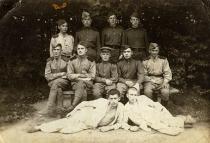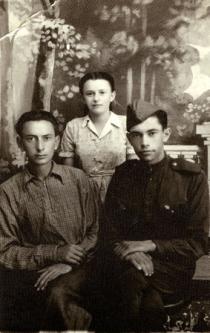This is a photo of my friends from Mielnica Podolska, from left: Roza Szternberg’s husband; Szymon Menczer; Roza’s brother - Dawid Szternberg; Roza Szternberg and Dawid’s wife Ita Apfelbaum. . The photo was taken in Mielnica after the World War II, in Dawid Szternberg’s studio.
Roza Szternberg was my aunt. I remember when she was to get married. The matchmaking could be in 1935, or 1934, and she was zero I guess, born in 1900 so she was already a spinster. I was maybe 10 at the time, and the matchmaker came with her would-be fiancé, right. I don't know where they'd come from but they weren't locals. They discussed all the issues: what and when, and what were each one's properties, right. The marriage did not take place eventually but I don't know why not. Her brother's name was Dawid. They were the only ones in the town who survived the war. They wandered through the forests, right. Without any help they wouldn't have survived, somebody did help them. Roza left the country right after the war. In 1946 she was already gone. First she went to Berlin. There was a whole Jewish colony there; afterwards she went to the USA. She lived in New York. The Szternbergs had a brother and a sister in the States. We were exchanging letters. She helped us after the war, she used to send us parcels. She died a year ago [in 2005], she was 103. Yes, a healthy vintage.
I was demobilized in 1946. I came back to my town, to Mielnica Podolska. And I was ill before that. I would perhaps serve longer but because of my health, my lungs, I was released. And everybody headed for their hometown. So did I. But I already knew nobody was there. In the summer of 1945 I wrote to my town, to the town council, or sovyet. It turned out they gave my letter to Dawid Szternberg who had stayed in Mielnica. He and his sister survived. Had anyone else survived? No. Just the two of them. And so I got a letter from him saying my family was all gone. There was nothing in it about the circumstances of their deaths. They had all been killed, that was all.
I didn't have any place to go anyway so I returned to Mielnica. When I got there the townspeople told me all the Jews had been deported to Borszczow by the Germans on one summer day in 1942. They made them walk the 20 kilometers to Borszczow. A ghetto was created there for the Jews from all the surrounding towns. They kept them for a week or two, hungry and cold, and later herded them into railcars and sent to a death camp somewhere. I've never been to Borszczow. I don't know the town. Besides, Dawid knew everyone was dead. They were gone from Mielnica without a trace.
I stayed in Mielnica for two, maybe three months. I stayed with the Szternbergs. I wasn't doing anything. I had been demobilized, they granted me the disabled soldier status, I waited for the repatriation transport to take me to Poland. My house still stood there but I didn't even try to get in. Nobody lived there, those gentlemen occupied it, the NKGB. Narodny Komisaryat Gosudarstvenoy Bezapasnosti, National Commissariat for State Security.
Mielnica had changed during the war. It was damaged. All the little houses, the poor Jewish houses surrounding the market square, right, had been burned by the Germans. You could see the absence. Normally before the war you wouldn't have seen the Dniester river because of the buildings. In 1946 I could see the bank of Dnestr, so something had vanished. The better houses, those worth something were surely left. Other thing was, there were more poor people I think. They lived in shanties, in adobe shingle-roofed huts. I left with the first repatriation transport.
















